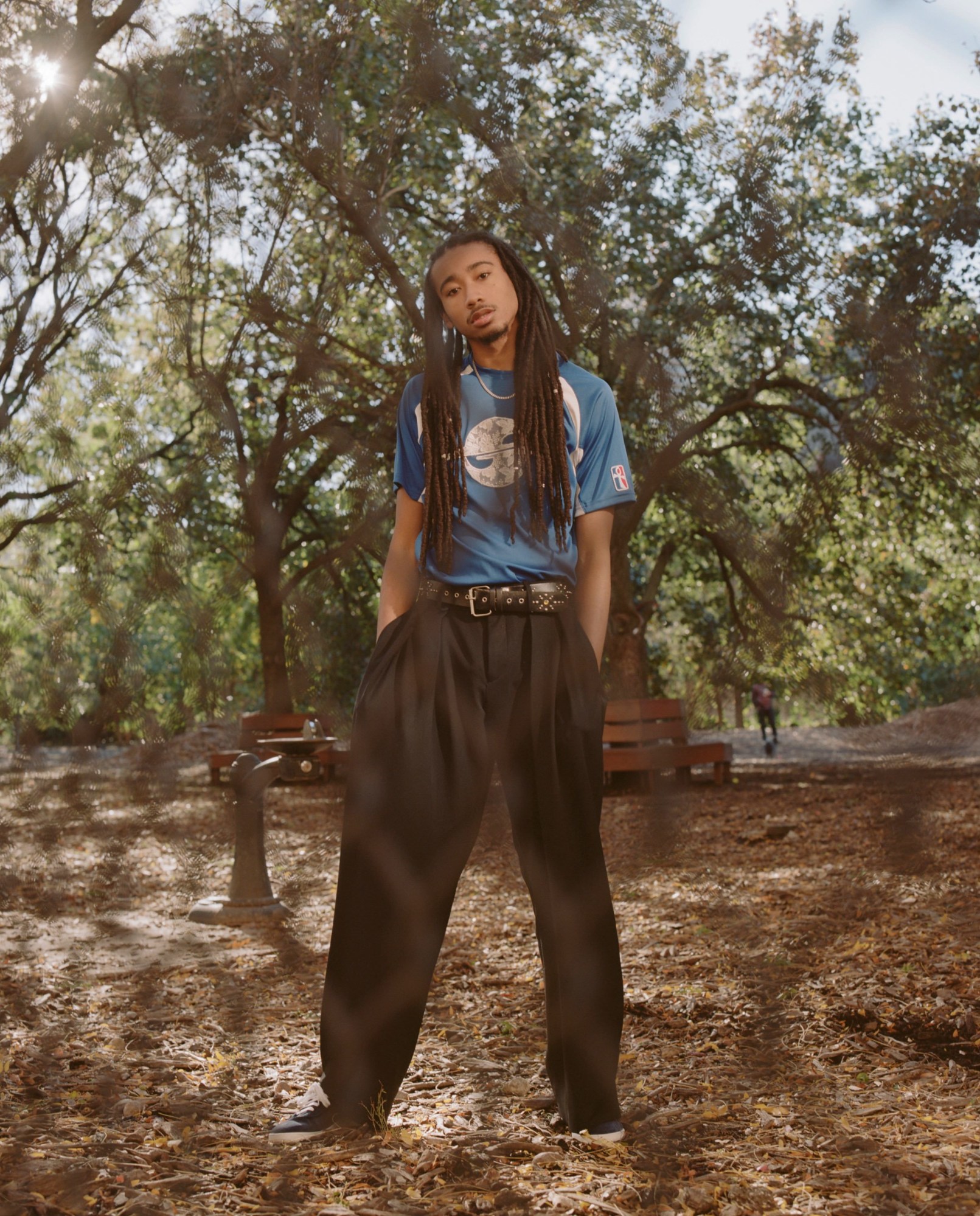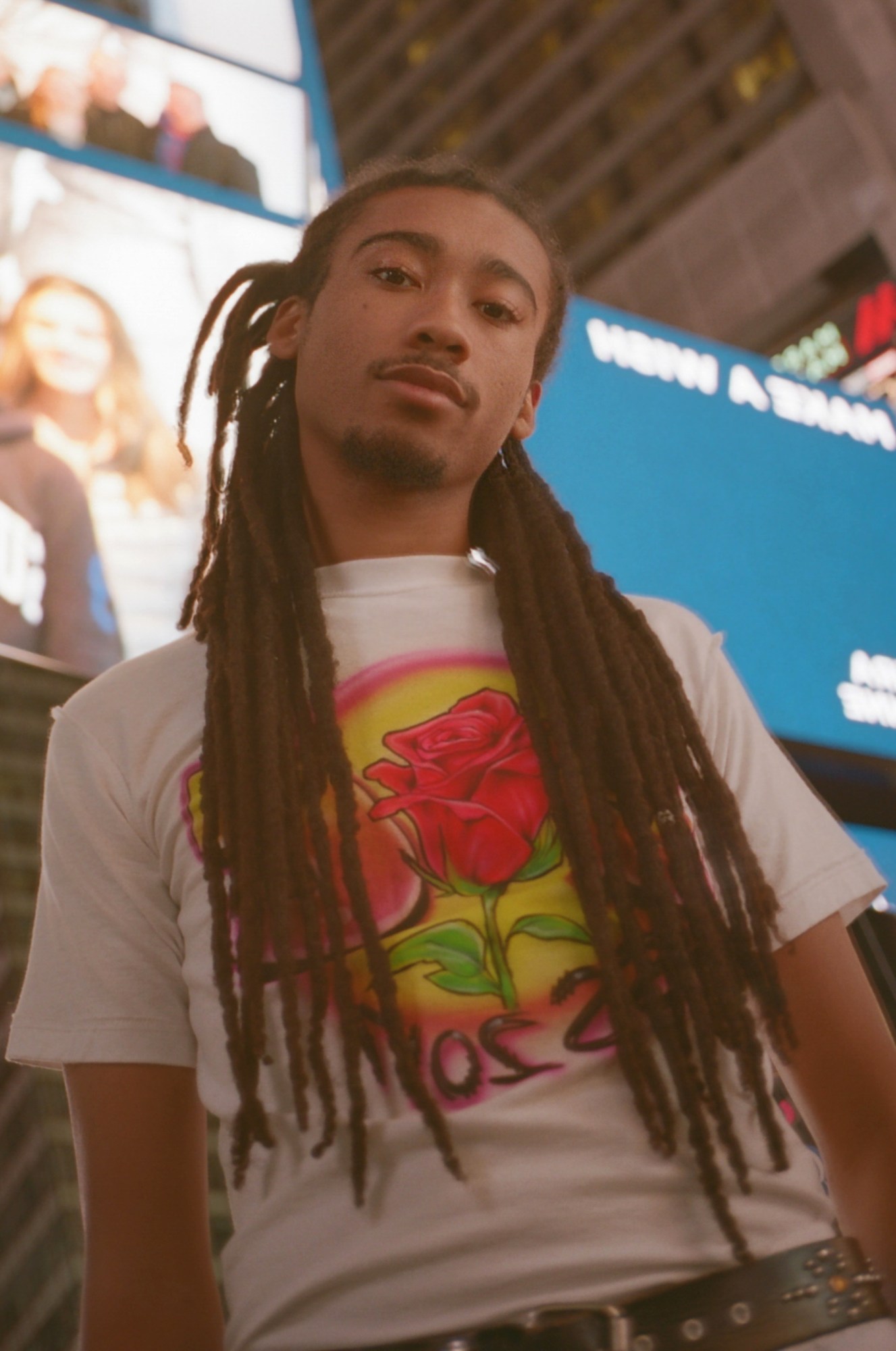It took several passes to uncover the speakeasy where Topaz Jones, a hip-hop vocalist from Montclair, New Jersey, released his latest album, Arcade. Hidden behind a bright and bare pizzeria where a handful of patrons were served dripping slices, two girls and one clipboard guarded the entrance. The space was intentionally dark and tight, necessitating movement: from a bar stocked with drinks named after Topaz’s tracks, to strips of seats, or the DJ booth, to the fork of traffic where he, all six-four of him, stood. His friends and family circled around excitedly while he remained quietly immersed in thought.
Topaz named his latest album Arcade because the word embodies his identity at this juncture as an artist and, arguably, his greatest creative goals for the work. “Arcade reflects many of the ideas I talk about [on the album] and the journey through countless obstacles to find my own voice as an artist, as a person. And it’s hard, too, to find that voice separate from what the internet is telling you.” Sort of like a racing game, where users tackle mudslides and bombs jutting in from nowhere, and where the journey enriches the destination. This album, Topaz continued, “is about entering an environment.” Creating a space for audiences to discover his music is important to Topaz because that’s how he discovered his own sounds.
You could say he started making this album before he could speak. His father, a guitarist who worked with funk bands like Slave and Aurra in the 70s and 80s before switching to smooth R&B, filled the house with tunes that became the soundtrack of his life. “There’s so much of life that I understood through the music that was played for me.” He went on, “I watched him make music for other people and watched the construction of songs. I started writing my own stuff when I was seven-ish, but I didn’t make anything good til I was older, 13 or 14. I wrote my own poetry to add to beats that I put together on this computer my grandmother bought me.”
Listening for so many years built his sound, although now he worries, “My experience listening to music is forever ruined because I’m constantly dissecting everything [it’s] based on.” He puts everything gleaned from listening to use when he writes, produces, and performs. Topaz threw concerts back home with his classmates and wowed audiences at local talent shows. “After I got one facet down, I would tighten up another.” All three — writing, producing, performing — are integral to his craft.
The album release party started early, just before eight, but things didn’t get going til later, about nine, when Topaz flipped on his track “Motion Sickness.” Like the bulk of Arcade, it’s designed to inspire movement. “I want [my audience] to move a certain way when they listen to [Arcade], for them to dance, to feel good,” he said. And as the DJ sputtered to get in her groove, the room wailed each time the music clipped off. Topaz Jones stayed sure, silently studying his tracks the way he’s studied so many others: what makes this part work, if I could change this, sharpen that…

The room’s energy was fed by every phase of Topaz’s musical development: his family, who praised his earliest work, when he emulated R&B singers by crooning about girls and things he hadn’t experienced yet; his friends from Montclair who, like him, struggled with the fragility of social acceptance and ideals of masculinity — especially black masculinity and specifically the fear of looking soft by singing about feelings, and burying that fear by spitting “a hot 16” at a party like a 90s gangsta-star; his first friends at NYU, and the ones he found later, after “I wrestled my way around the city to find people that I wanted to surround myself with” for the betterment of his music. The partygoers around us were the ammunition that had helped Topaz defeat every obstacle impeding this moment.
His mother played a crucial role in this. A Harvard grad who worked with the Black Panthers, she gave Topaz a consciousness and emphatic spirit that shapes his music. Back in 2013, when Topaz wrote “Coping Mechanism” in 2014 as part of his debut album The Honeymoon Suite to discuss disturbing trends in police brutality, he was still choking on the bitter facts. Like the rest of his earlier work, it stopped short of emotional intimacy. Now, he’s evolved, instead focusing on the feelings watered by these conflicts. He wants Arcade to be something that “helps people to relate to what I am going through, that helps make a difference, make special moments, and embodies the human condition.”
His new music urges people to live without the weight of present-day issues — Trump versus Clinton, riots, the endless videos of men being gunned down without cause — through a concertedly thoughtful creative process. “It’s a bit different every time I start. Mainly, I work with producers, with people who know me in and out, and the sounds that inspire me, and the things going on in my life,” he explained. Those things include the 24-hour news cycle, “the media, the election. And I try to lay some context for what I’m feeling that day and the goal is to make that feeling tangible. ‘Tropicana’ was finished quickly because [me and Daniel Lonner, a producer] were on the same wavelength.”

This creative process works for Topaz right now, but he’s still growing. Arcade is his first attempt at showing his full self. Before, in earlier work, “there was a lot of stuff that everyone else thought was dope that I felt I needed to do to prove something and be this rapper’s rapper before I could be a real artist.” In a way the journey was a blessing. Topaz doesn’t “worry anymore about someone calling me out, putting me to the test because I know I can give people good lyrics. But the focus, now, is giving people the best music possible.” In his late teens, he was inspired by 90s legends like Nas. Today, he studies the forebearers to hip-hop: funk and soul, adding in new wave and psychedelic rock. He’s grown sure enough of himself to embrace his inner flowerchild.
Less lost than he’s ever been before, Topaz is hunting for his next sonic journey. We chatted about the hip-hop albums we’ve got stuck on repeat right now: Kanye West, Kendrick Lamar, and the record Thelonious Martin dropped last week. Then, the conversation lept to pop music, because Topaz enjoys listening to almost anything. “I’m obsessed with Bruno Mars,” he shared.
Credits
Text Kristin Huggins
Photography June Canedo
Styling Tess Herbert
